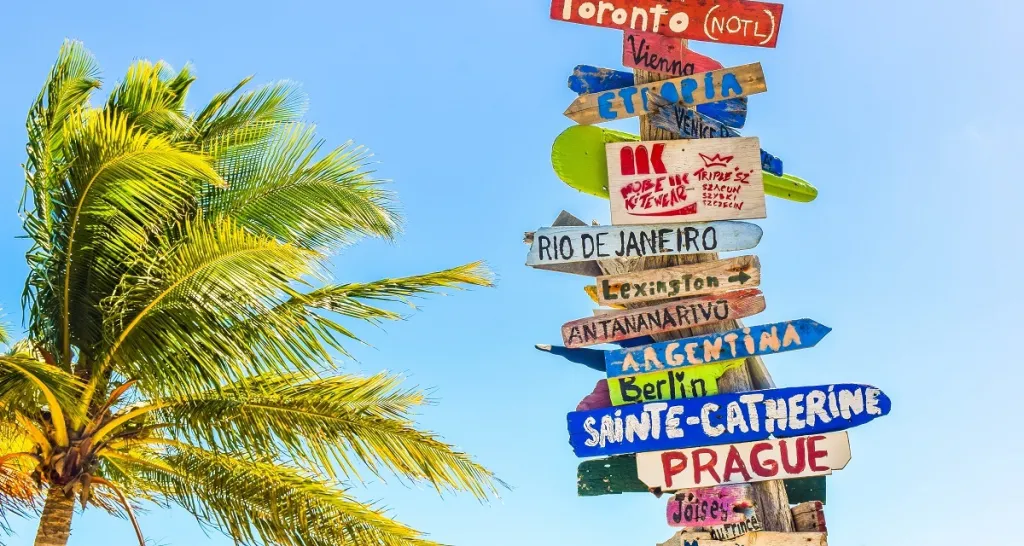Los Angeles is more than Hollywood stars. From hikes with killer views to beaches straight out of a rom-com, here are 10 must-do LA experiences for Filipino travellers or any wanderers in general!
Why You Shouldn’t Care When “No One Cares About Your Travels”

You’ve come home from one epic adventure, ready to recount your tiring yet exciting journey to anyone who would lend an ear… only to realise that . Sounds familiar? If you love to travel, chances are this has happened to you before. And science says you’re not alone.
The science of not caring
According to an intriguing piece by Jonathan Look Jr. published on Forbes.com, there’s a scientific reason behind this phenomenon — and it’s more common than you think. You’ll see it in the way your friends become disengaged while conversing about your recent climb or cultural immersion. Or maybe in the way your family gradually changes the topic when you start talking about your last solo trip. While you’re itching to tell them stories of how you lived like a local in some remote village, they’re more interested in what’s been happening in your own barangay. They don’t want to know what or etag tastes like; they don’t even know what those delicacies are.

An inconclusive experiment?
To affirm this, Look Jr. cited a paper titled The Unforeseen Costs of Extraordinary Experience by Harvard psychologists Gus Cooney, Daniel Gilbert, and Timothy Wilson. As Look Jr. puts it, the experts “discuss how exceptional experiences make us both ‘alien and enviable’” and how “moving towards new things in life inevitably moves you away from others.” While we can’t deny that travel is indeed a most exceptional and extraordinary life experience, we can’t help but question how the hypothesis was proven either.
In the study, the Harvard psychologists conducted an experiment using two videos: funny footage of a street performer (which the subjects had to watch alone) and a “crappy video animation to watch together”. In doing so, Cooney, Gilbert, and Wilson tagged the street performer video as the extraordinary experience (which the subjects had to go through alone), while the substandard animation served as a normal or underwhelming experience (but one that was shared within a bigger group).
Not to be a skeptic, but we can hardly arrive at a solid conclusion based on an experiment that merely used cartoons and footage of a street performer. First of all, these videos don’t encapsulate travel as an exceptional life experience; they don’t even come close. Second, while the experiment did explicitly mention that it was just testing extraordinary experiences in general, the setup had nothing to do with travel. Third, extraordinariness is quite subjective, don’t you think? What’s exceptional to me may be plain to others, but of course, that’s already a given. It’s safe to say, though, that the analogy has its own merits.
Two sides of the coin

Imagine this: If you start divulging details of a recent diving trip to one of the Philippine’s most beautiful diving spots, do you think that someone who doesn’t even know how to swim can relate? What about someone who has never been to a beach? Naturally, the answer is no. But while Look Jr. spotlights the alienating quality and tendency of travel, there are other factors that also come into play.
Travel envy and personal preferences
Add into the mix the green-eyed monster and the fact that people just have varied preferences, and it’s easier to understand why you sometimes feel like . If it’s a classic (and pitiful) case of travel envy, then there’s nothing left to talk about. Sometimes, travel brings out uglier reactions simply because we’re frustrated that we weren’t there. We are but human after all.
Also read: Don’t Hate: There are Healthy Ways to Deal with Travel Envy
Preferences, meanwhile, shape the way we act and react. Going back to the example of diving, if the person you’re conversing with doesn’t like going to the beach at all, then don’t expect him or her to be enthusiastic when you start talking about all that fun in the sun. Remember, in between bouts of travel envy and simply not being able to relate to your stories is middle ground for people who 1) Aren’t interested AT ALL in travel, 2) Aren’t interested AT ALL in your affairs, and 3) are alienated by ANY life experience that veers away from their own version of the daily grind and their own version of extraordinary. In short, just because you love travel, doesn’t mean they do too — and that’s perfectly fine!
True or false: Alienation = lack of interest?
Of course, there is also the chance that those who find themselves unable to relate will still care. For example, it’s possible that alienation also encourages curiosity and concern, and ultimately the desire to try the same extraordinary experience. Again, the outcome largely depends on how a person reacts to instances of alienation — something that you can never control, and will therefore always be a limitation for studies tackling the same subject.
That said, there are many factors that would lead to a person’s enthusiasm (or lack thereof) when you start sharing details about an exceptional experience (like your recent sojourn). This could both prove and disprove the fact that , but the real question is, should that even bother you?
Travel for yourself first

At the end of the day, if you travel for the right reasons, then the way anyone else reacts to your travels shouldn’t bother you at all. You shouldn’t mind that “” because you aren’t doing it for them. You travel for yourself first — for your enrichment and fulfillment.
I’ve heard many versions of this story again and again. I know of someone who travels long-term, with each trip as equally immersive as the last. And when he’d come home to his friends, they all seem to resent him for having nothing to talk about but travel. But he was simply sharing tidbits of an extraordinary experience, so where’s the fault in that?
Another common example is how family members would secretly take it against other (often younger) family members for being “too into travel”. I’m sure they’re just looking out for their siblings/sons and daughters/grandsons and granddaughters/nephews and nieces (you get the picture), but for as long as they’re able to budget their earnings and set aside their savings, then they shouldn’t be shamed for wanting to explore the world.
Also read: 15 Lines Travellers Are Sick Of Hearing During Family Reunions
So to those who might feel like , know that you aren’t alone. And remember, it shouldn’t even matter. The pleasure and wisdom you derive from your own life experiences shouldn’t depend on how others view them or react to them — on any digital space or in real life, for that matter.
Travel for others the right way

One of the greatest pleasures of travel is how it connects people. Through the extraordinary experience of seeing the world and living other cultures, travel should, in fact, inspire and educate — not alienate. Travel should bridge gaps, not make them.
If you find yourself eager to share your travel stories, take pride in the fact that you want to cause a positive ripple in the travel scene and beyond. Never mind naysayers who habitually express apathy or disdain over travel stories that were meant to spread positive vibes in the first place. Don’t pay attention to sourpusses who brand your enthusiasm towards travel as bragging. And lastly, don’t take offense should people display a lack of interest — it is as much their right as it is yours to freely recount your travel tales.
Also read: Why We Have to Stop Travel Shaming
Looking at it from another angle, it’s worth noting how studies highlight alienation, apathy, and even jealousy in travel, given that there’s also scientific evidence which proves travel makes us happy. But that’s for another day and another story. And that just illustrates how travel is an endless dichotomy of human nature’s complexity: We take the bad with the good, but it’s up to us to ultimately turn it into something better.
So never mind if, at certain times, you feel that . What matters is what travel has done for you and those who are willing to listen. Continue to make travel happen and keep on spreading positive vibes one travel story at a time!
Also read: Here’s Why Travelling Brings Out the Best in People
Published at
About Author
Alyosha Robillos
Subscribe our Newsletter
Get our weekly tips and travel news!
Recommended Articles
10 Best Things to Do in Los Angeles 10 Commandments for Responsible Travel Flexing Spread the good word!
10 Cutest Cafes in Japan That Are Totally One of a Kind From Pikachu snacks to Totoro cream puffs, here are 10 themed cafes in Japan that prove café hopping should be part of your travel itinerary.
10-day Christmas and New Year Japan Trip: Complete Travel Itinerary Celebrate Christmas and New Year in Japan with this 10-day holiday vacation itinerary packed with Tokyo lights, Kyoto charm, and Osaka adventures.
10 Fairytale Castles In Europe Filipinos Need To See! Permission to feel like royalty even for a day?!
Latest Articles
Indonesia Bans Elephant Rides At All Tourist Spots Indonesia has officially ended years of animal exploitation in tourist spots.
Where Does Your P1,620 Actually Go? The Real Breakdown of the Philippine Travel Tax Discover exactly how your travel tax is spent and why some leaders want it gone.
LRT 2 and MRT 3 Offer Free Rides for Philippine Women’s Open Participants Free train rides available
Japan Sakura Trip on a Budget: Where to Spend, Where to Save (Without Sacrificing Comfort) Here's how to score a discounted spacious apartment for your Japan trip!
BGC Master Plan Refresh: What Filipino Travellers Can Expect City upgrade insights

